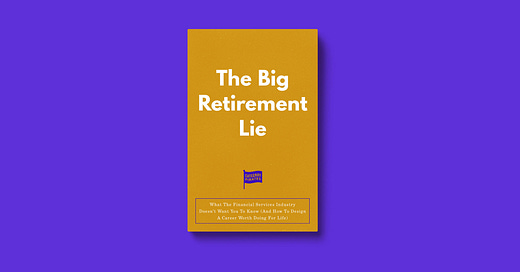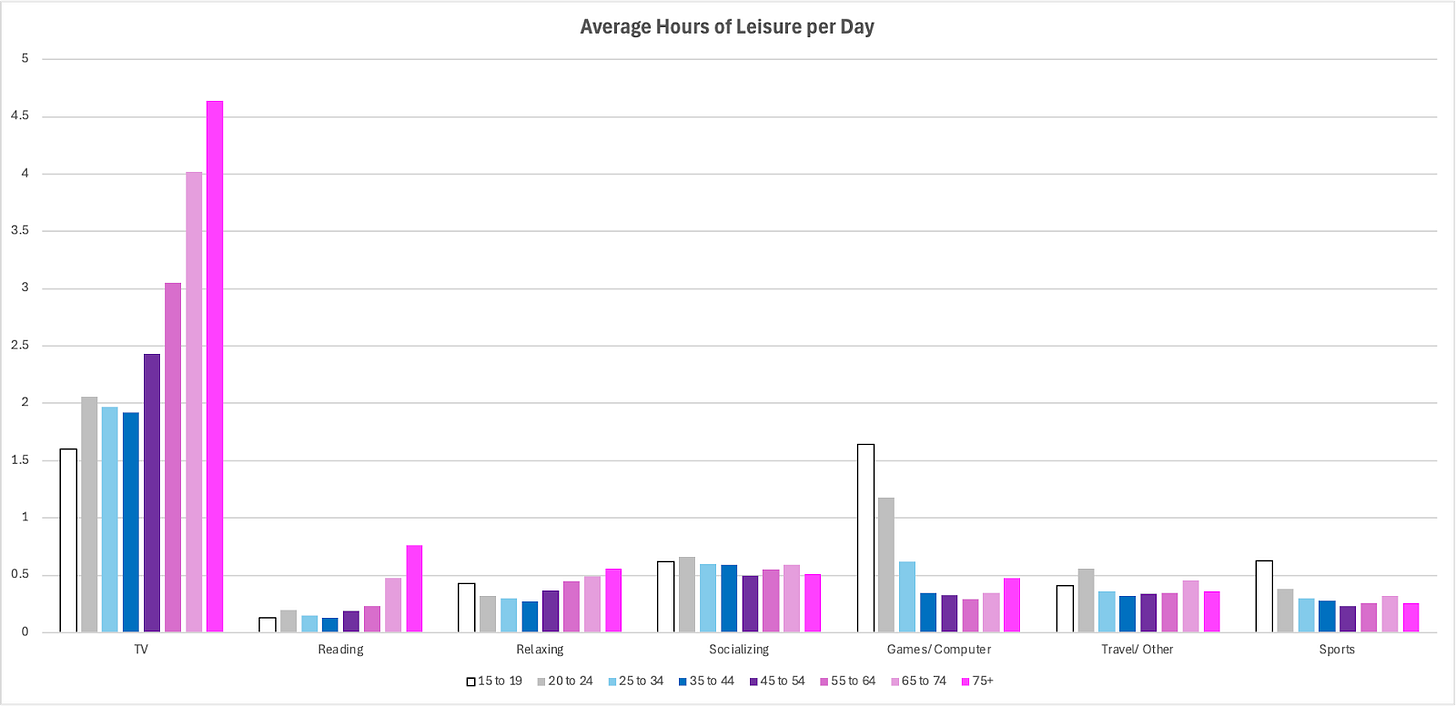The Big Retirement Lie: What The Financial Services Industry Doesn’t Want You To Know (And How To Design A Career Worth Doing For Life)
Never say the “R” word.
Arrrrr! 🏴☠️ Welcome to a 🔒 subscriber-only edition 🔒 of Category Pirates. Each week, we share radically different ideas to help you design new and different categories. For more: Dive into an audiobook | Listen to a category design jam session | Enroll in the free Strategy Sprint email course
Dear Friend, Subscriber, and Category Pirate,
Everything we value, we've been taught to value.
Including retirement.
Retirement is sold to us as the dream of endless leisure after decades of hard work. The pot of gold at the end of the rainbow. The promise is if you save enough, invest wisely enough, and delay gratification long enough, you'll reach the promised land of permanent vacation.
This is one of the biggest lies ever created by society and the Social Security Act.
And it's built on a web of even BIGGER lies:
The "Unlimited Leisure Is Good" Lie makes you believe you'll never get tired of leisure, you'll never get bored, and your thirst for luxury and leisure can be satisfied.
The "Retirement is Achievable" Lie: This makes you believe your financial advisor knows best, you just have to consistently invest in your 401k, the government and/or your company will take care of you, and you won't have unexpected bills.
The "Work Is Bad" Lie: This makes you believe not having a job is good, not feeling busy or productive is good, and not having work colleagues or responsibilities is good.
Here's a truth: These lies have created generations of Knowledge Workers chasing the wrong destination. You work to build a 40-year financial runway to “retire” when you might only need a four-year runway to design a lifelong career you love. You optimize for escape when you want to optimize for agency.
There’s no shortage of data that disproves every one of these misconceptions.
🔊 Want to listen to this mini-book instead? Head to the audiobook.
Let’s start with the “Unlimited Leisure Is Good” lie.
The most Piratey data we’ve found, from the Bureau of Labor Statistics in 2023, shows that Americans 75 and older have about 7.5 hours of leisure time per day (3.7 hours more than those aged 35-44). But where does all that "freedom" go?
It goes to watching TV.
Now, we like to watch sports, movies, and Netflix as much as the next pirate. But is that really what you want to spend your "golden years" doing? Sitting on your butt watching shows you won't remember tomorrow?
If you’re nodding “yes,” you won’t want to hear what’s next.
But if you’re the pirate we know you are, you want to be more than a binge-watching barnacle.
You want to do work that’s so enjoyable, you’ll do it until you end up in Davy Jones’ Locker. Because retirement’s “unlimited leisure” honeymoon phase ends quickly. Just think about the excitement of your last vacation. How the first few days felt like paradise, but by day ten, you started thinking about an exciting work project or checked work emails. That's retirement for many people—but with no end date.
The novelty of unlimited free time wears off faster than anyone expects.
And boredom isn't just unpleasant. It's dangerous.
People who reported being chronically bored were more likely to die younger from conditions like heart attacks and strokes. Compare that to a 2019 University of California-Riverside study that discovered people aged 58 to 86 who took three to five classes for three months (such as Spanish, photography, and music composition) improved their cognitive abilities to match others 30 years younger.
A rejection of unlimited leisure created "unretirement”—a new category of work.
Unretiring is returning to work after considering yourself retired.
The Innovation Foundation found that, on average, 33% of retired workers across six countries are now unretiring. But not all retirees are equally likely to return to work. There's a weird data pattern when looking at skill levels:
High-skilled workers (41%) are most likely to unretire
Low-skilled workers (39%) follow closely behind
Mid-skilled workers (30%) are significantly less likely to return
Pay attention to this "hollowing out" of the middle. Mid-skilled jobs are the first to be automated or eliminated, making return more difficult. And when it comes to taking a step down, high-skilled workers are actually more willing to accept lower-level positions than low-skilled or mid-skilled workers.
But look closer and you'll see a tale of two retirements:
Low-skilled workers primarily unretire because they can't afford to stay retired. This economic pressure is particularly pronounced in Japan, South Africa, and the USA, where poverty rates among older and low-skilled workers exceed 20%.
High-skilled workers say personal fulfillment is their primary motivation. Work provides more than just a paycheck. The Innovation Foundation study found that social connection and purpose rank high among reasons for returning: 17% return to feel recognized and valued and 15% return to socialize with others.
Reframing retirement as “unretirement” gives you the freedom to design your dream career:
Vera Wang didn't start her fashion design career until age 40 after "retiring" from her role as a fashion magazine editor. Her most productive and profitable years came during what would traditionally be considered retirement age.
Clint Eastwood has had multiple careers, including acting, directing, and even serving as the mayor of Carmel, California. He has come out of retirement several times, continuing to act and direct well into his 90s.
Dolly Parton, at 78, has rejected the concept of retirement. She once said, "I don't plan to retire. I just plan to die in the middle of a song on stage hopefully." For Parton, her career isn't just work—it's a dream she must keep alive.
These examples aren't exceptions.
Our friend and "Retirement Answer Man” Roger Whitney runs the Rock Retirement Club, a community of thousands of retirees. He found what most people actually want isn't to stop working. It's "time freedom" and the ability to do things that genuinely interest them. As he puts it,
"When I asked people what they mean when they use the word 'retire,’ they don't even think about necessarily not working. It's about having control over time, over freedom. That's number one. And number two is to do things that actually interest them, because a lot of us become really good at things that don't interest us because of how we build our careers."
Instead of viewing retirement as an on/off switch, Roger encourages us to think of it as a dimmer switch.
For example, Roger knows a neurologist who planned to retire but found a different path. First, he went independent from the hospital. Then, he constrained his office hours. Finally, he decided to only take cases he found interesting. Each iteration gave him more time freedom, while maintaining purpose and income.
The true aspiration of retirement is not about the activity in your life—it’s about agency over your life.
This mini-book will reject the premise of retirement and break down:
How the Big Retirement Lie began—and how to reframe your retirement lens
What it looks like to find work you love, from an 84-year-old pilot and 94-year-old farmer
The 3 career levers you can pull to design work worth doing (and what happens when you do)
Because as Peyton Manning said to Lorne Michaels during the 50th anniversary of Saturday Night Live, "Never retire. It's brutal out here."
Let’s dive in.
The Evolution Of The Big Retirement Lie
Before the 1980s, companies took care of retirement. So your job as a worker was simple: Work for one company for 30+ years, get a gold watch, and collect a pension until you die. In 1980, 46% of all private sector workers were covered by a pension plan.
(This is why Pirate Christopher was told to “get a good government job” as a young pirate.)
Then, retirement changed.








